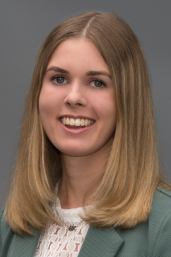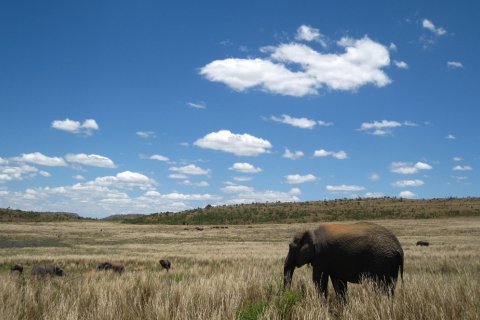Interview with Madelon Wind, researcher

My name is Madelon Wind. I work as an external PhD researcher at the Economics department of Utrecht University and the University of Twente. I also work as a researcher/consultant at the PPRC (Public Procurement Research Centre). I am also an affiliated member of the Utrecht University Centre for Public Procurement (UUCePP).
My Master's degree in Finance taught me that I am human-focused, which made me look beyond my penchant for numbers. The more relational, care-focused, sides interest me a lot. I focus on these themes in my doctoral work. My research with this is in line with my interests, and thus I am really committed with conducting the research.
Outside of work, I'm always busy. My horse has a big role in this. I enjoy the interaction with an animal, being outdoors, and exercising. I also enjoy meeting up with friends or delving into a (scientific) topic. With the latter, I tend to remember a lot. I sometimes argue jokingly, when I'm 50, I'll sign up for 1-on-100 or a show alike. By then, my head will be full of crazy tidbits.
What do you work on, and why?
In my thesis I focus on how municipalities can build and maintain relationships with social care providers, in the context of commissioning youth care. In the process of commissioning, municipalities set the frameworks for efficient and effective care provision, for example by setting contractual requirements. But in addition to the contractual elements, I think the input of and the relationship with providers is even more important. A bad relationship can hinder the achievement of goals set by the municipalities. And building a relationship with, for example, a new provider can start with the first market consultation prior to tendering.
Through various advisory projects I discovered that municipalities aim to achieve goals, such as client satisfaction or focusing on results. In the perception of some public officers however, (some) healthcare providers stand in way of achieving goals. I found this striking, especially when I found that healthcare providers told me the same story while often aiming at the same goals. But now ‘the problem’ was the municipality. I thought I had to do something with that. And from my interests I saw myself doing this for a long time.
I went looking for suitable literature and found a lot from the private sector. Remarkably, little is known about this topic in the public healthcare sector. This makes my research a challenge, but that also increases my interest. I think my research can really contribute to the youth care system and how municipalities work with care providers. That's the best motivation you can have as a researcher.

Another challenge, when I translate my research for practice, is that people quickly think that I make a plea to 'do everything together'. This is certainly not the case. Municipalities and care providers can spend their time and capacity only once, and unseeded cooperation does not motivate. I therefore only advocate cooperation when it pays off. This can lead to, for example, that municipalities work closely with one provider and with the other occasionally.
What makes you get out of bed in the morning? And is this different because of the COVID-19 crisis?
During the week I get out of bed for work, on weekends for my horse. I don't mind getting up early, I like being productive. That is why I am so happy with my activities in the social domain, as a scientist and advisor. I feel that I am very productive there: with my work I contribute to the social system that supports people with less luck in life. That's what I like to stand up for early! COVID-19 makes no difference in this, especially now, it is important to make ourselves strong together.
Is there something you appreciate in current changing circumstances?
Yes, definitely! Even though I understand the unpleasant sides that people experience. I really appreciate the togetherness, flexibility and resilience people show. Unfortunately for some, this seems to be gone, but fortunately the majority is still in it.
Should we go back to our old way of life after the crisis, or not?
This is a tricky one. A bit of both, I think. A lot of things were very nice in the old life: the freedom and social contacts that people do mentally well and bring a lot of fun. On the other hand, I hope that we will also learn from this 'crisis'. By being stopped rushing, you start thinking. In a few decades, a lot has changed and a lot is 'normal'. The bar for young people to perform is very high. More than ever, minors need youth care in order to live happily, is the perception. COVID-19 also underlines to me the climate problems: the ease with which the virus spread underlines the influence of humans on the world. COVID-19 forces us to look critically at that and enjoy more of what we have and can do, close to home. As a research centre, UUCePP has an important role in this: I believe research into socially responsible procurement, innovative methods of purchasing and professionalization of the commissioning of social services are important catalysts on the way to the 'new, old normal'.
Which professor stayed with you during all of your studies, and why?
Good one! I immediately have to think of my economics teacher in high school: Jos Holtslag. He not only managed to teach a group of adolescents to economic models and other basic economic principles, but also to enthuse us about them. I often think about how he taught. I remember his lessons well, including the content. With wonderful examples he made economics, then something far from our mindset, tangible. I think that's very clever. You are not only a teacher with a passion for your profession, but also a good leader. When I teach, I always think, how would Mr. Holtslag handle it?'. So, his influence extends far beyond teaching economics.
Which book has impressed you the most, has shaped you, and would you read 100 more times? And why?
Recently I read 'The Murderer's Daughters' by Randy Susan Meyers. Meyers was a youth care worker before becoming a writer and wrote the book from her experiences. You can read this in the story, that really touched me. The book is about two young sisters who, after a family drama, became orphans and end up in the youth care circuit. The writer tells the story from the perspective of the growing children. She expresses the pain and the sadness, but also the resilience, very well. You can almost experience what it's like to grow up like this. The book really makes you think.

